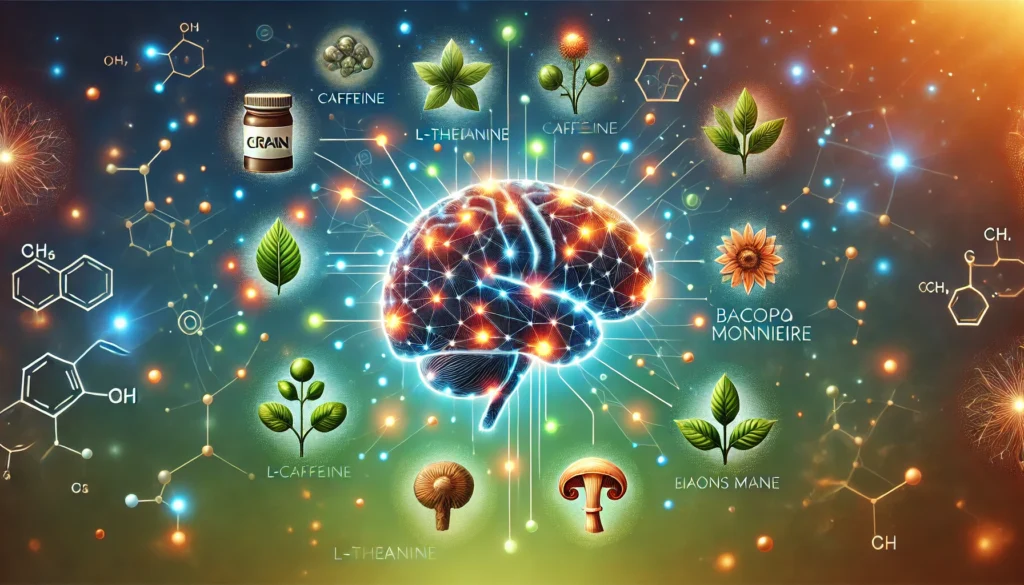In this article, we’ll delve into the best-rated nootropics available on the market, explore their benefits, and provide insights into how they work.
Understanding Nootropics: A Brief History
The Origin of Nootropics
The term “nootropic” was coined in the 1970s by Romanian psychologist and chemist Dr. Corneliu E. Giurgea. The word stems from combining the Greek words “nous” (mind) and “trepein” (to bend or turn), symbolizing the ability to alter cognitive function. Dr. Giurgea’s groundbreaking research laid the foundation for a new class of cognitive enhancers that emphasized safety and neuroprotection.
You may also like: Top Memory Supplements to Combat Dementia
Giurgea’s Criteria for Nootropics
Dr. Giurgea outlined specific criteria for substances to be considered nootropics. He emphasized that these compounds should enhance learning and memory, protect the brain from physical or chemical injury, improve the efficacy of the tonic cortical/subcortical control mechanisms, and be virtually free from side effects. This framework has guided the development and evaluation of nootropics for decades.
Expansion of the Nootropic Definition
Over the years, the definition of nootropics has broadened. Today, it encompasses a wide array of substances, ranging from natural herbs and amino acids to synthetic compounds, all aimed at improving brain health and function. This expansion reflects the growing interest in optimizing cognitive abilities through various means, including dietary supplements and lifestyle changes.
The Science Behind Nootropics
Mechanisms of Action
Nootropics work through various mechanisms to support brain health. Some increase blood circulation to the brain, enhancing the delivery of oxygen and essential nutrients, which can lead to improved cognitive performance. Others modulate neurotransmitters, the brain’s chemical messengers, to improve mood, focus, and cognitive abilities. Understanding these mechanisms can help individuals choose the right nootropic for their needs.
Individual Variability in Response
The efficacy of nootropics can vary significantly based on individual biochemistry, lifestyle, and specific cognitive needs. Factors such as genetic predispositions, existing health conditions, and even diet can influence how a person responds to a particular nootropic. It’s crucial to approach nootropics with an understanding of these variables to maximize their potential benefits.
Safety and Side Effects
While many nootropics are considered safe, it’s important to be aware of potential side effects. Even natural substances can interact with medications or cause adverse reactions in some individuals. Consulting with a healthcare professional before starting any nootropic regimen can help mitigate these risks and ensure a safe and effective experience.
Best Over-the-Counter Nootropics for Focus
1. L-Theanine and Caffeine
Synergistic Effects
This combination is among the most popular and best-researched nootropics. L-Theanine, an amino acid found in green tea, promotes relaxation without sedation. When paired with caffeine, it enhances attention, alertness, and focus while minimizing the jitteriness often associated with caffeine alone. This synergy makes it a favorite choice for those seeking a calm yet focused mental state.
Dosage and Timing
The optimal ratio of L-Theanine to caffeine is typically around 2:1, with common doses being 200 mg of L-Theanine and 100 mg of caffeine. Timing is crucial; taking this combination in the morning or early afternoon can help sustain focus throughout the day without affecting sleep patterns.
Research and Evidence
Numerous studies support the efficacy of this combination. Research indicates that L-Theanine and caffeine together can improve cognitive performance, particularly in tasks requiring mental endurance and alertness. This evidence underscores the potential of this nootropic duo for enhancing productivity and focus.
2. Bacopa Monnieri
Historical Use and Benefits
An ancient herb used in traditional Ayurvedic medicine, Bacopa Monnieri is known for its ability to improve memory and cognitive processing. Historically, it has been used to enhance learning and retention, making it a staple in cognitive enhancement regimens for centuries.
Mechanism of Action
Bacopa Monnieri works by enhancing the communication between neurons and supporting brain cell regeneration. It is believed to modulate neurotransmitter activity, particularly the serotonin and dopamine systems, which can lead to improved mood and mental clarity.
Clinical Studies and Findings
Several studies have shown that Bacopa Monnieri can enhance cognitive performance in healthy adults. Research suggests that consistent use over several weeks is necessary to achieve the best results, highlighting the importance of patience and persistence when using this nootropic.
3. Rhodiola Rosea
Stress Adaptation
Rhodiola Rosea is an adaptogenic herb that helps the body adapt to stress. It’s been shown to reduce fatigue, improve mood, and boost cognitive function, making it an excellent choice for those seeking mental clarity under pressure. Its adaptogenic properties help maintain balance in the body’s stress response systems.

Cognitive Enhancement
Beyond stress reduction, Rhodiola Rosea enhances cognitive performance by improving mental energy and reducing symptoms of burnout. This makes it particularly beneficial for individuals in high-pressure environments who need to maintain sharp focus and clarity.
Supporting Research
Clinical trials have demonstrated Rhodiola Rosea’s efficacy in enhancing mental performance and reducing stress-related fatigue. These findings support its use as a natural option for boosting cognitive resilience and focus.
4. Ginkgo Biloba
Historical Significance
One of the oldest living tree species, Ginkgo Biloba has been used for centuries to support brain health. Its long history in traditional medicine underscores its reputation as a powerful cognitive enhancer.
Mechanism and Benefits
Ginkgo Biloba enhances blood flow to the brain, which can improve memory and cognitive speed. It also exhibits antioxidant properties that protect against cellular damage, supporting overall brain health and function.
Evidence from Studies
Research indicates that Ginkgo Biloba can be particularly beneficial for older adults experiencing age-related cognitive decline. Studies have shown improvements in memory, attention, and processing speed, making it a valuable tool for maintaining cognitive vitality.
5. Lion’s Mane Mushroom
Neurological Benefits
Lion’s Mane Mushroom is a natural nootropic that promotes nerve growth factor (NGF) production, which is essential for brain cell health. It has been linked to improved memory, focus, and overall cognitive function, highlighting its potential as a neuroprotective agent.
Role in Neurogenesis
By stimulating NGF production, Lion’s Mane supports the growth and repair of neurons, which can enhance learning and memory. This makes it a promising option for those looking to support long-term brain health and cognitive performance.
Research Insights
Studies on Lion’s Mane have shown promising results, particularly in the areas of memory enhancement and neuroprotection. While more research is needed, current findings suggest it could be a valuable addition to cognitive enhancement strategies.
6. Acetyl-L-Carnitine
Energy and Cognitive Health
This amino acid derivative plays a vital role in energy production within brain cells. Acetyl-L-Carnitine has been shown to enhance memory, learning, and overall cognitive health, making it a popular choice for brain support.
Mechanism of Action
Acetyl-L-Carnitine facilitates the transport of fatty acids into the mitochondria, where they are converted into energy. This process not only supports brain energy metabolism but also helps reduce oxidative stress, contributing to neuroprotection.
Supporting Research
Clinical studies have highlighted Acetyl-L-Carnitine’s potential in improving cognitive function, particularly in older adults. Its ability to support brain energy production makes it a compelling option for maintaining cognitive vitality.
7. Phosphatidylserine
Cellular Support
An essential phospholipid found in high concentrations in the brain, Phosphatidylserine supports cellular function and communication. It is linked to improved memory and cognitive performance, particularly in aging populations.
Mechanism and Benefits
Phosphatidylserine contributes to maintaining cell membrane integrity and facilitating neurotransmitter release. This enhances synaptic function, which is crucial for learning and memory processes.
Research and Evidence
Studies have shown that Phosphatidylserine supplementation can improve cognitive performance and reduce the risk of cognitive decline. Its benefits have been particularly noted in older adults, supporting its use as a cognitive enhancer.

Nootropics and Adderall: A Comparison
Prescription vs. Over-the-Counter
Adderall is a prescription medication commonly used to treat attention deficit hyperactivity disorder (ADHD). While effective, it comes with a range of potential side effects and risks of dependency. Nootropics, on the other hand, offer a more natural and less risky alternative for enhancing focus and cognitive function.
Side Effects and Safety
Unlike Adderall, over-the-counter nootropics typically have fewer side effects and can be used by a broader audience. However, they may not be as potent in their effects, making it essential to set realistic expectations when using them for cognitive enhancement.
Situational Use
While Adderall is often prescribed for specific medical conditions, nootropics can be used by anyone seeking cognitive enhancement. This flexibility allows individuals to choose options that align with their personal health goals and lifestyle needs.
Choosing the Best Nootropic Supplement
Assessing Cognitive Needs
When selecting a nootropic supplement, consider factors such as your specific cognitive needs, health conditions, and any other medications you may be taking. It’s advisable to consult with a healthcare professional before starting any new supplement regimen.
Evaluating Product Quality
Look for nootropics that are well-researched, have clear ingredient labels, and come from reputable manufacturers. Reading customer reviews and checking for third-party testing can also provide insights into the product’s quality and efficacy.
Personalization and Experimentation
Finding the right nootropic often involves some trial and error. Personalization is key; what works for one person may not work for another. Be open to experimenting with different combinations and dosages to find the most effective solution for your cognitive goals.
Future Trends and Implications
Growing Demand for Cognitive Enhancers
The demand for cognitive enhancers continues to grow, driven by the increasing pressures of modern life and the desire for improved mental performance. As research progresses, we can expect to see more advanced formulations and a deeper understanding of how nootropics can support brain health.
Innovations in Biotechnology
Innovations in biotechnology and personalized medicine may also pave the way for custom-tailored nootropic solutions. These advancements could cater to individual genetic profiles and specific cognitive needs, offering more precise and effective cognitive enhancement strategies.
Ethical and Regulatory Considerations
As the nootropic market expands, ethical and regulatory considerations will become increasingly important. Ensuring product safety, efficacy, and transparency will be crucial in maintaining consumer trust and advancing the field of cognitive enhancement.

Conclusion
Nootropics offer a promising avenue for enhancing focus and cognitive function without the need for prescription medications. With a wide array of options available, from natural herbs to synthetic compounds, there’s likely a nootropic that fits your lifestyle and cognitive goals.
By understanding the science behind these supplements and choosing the right products, you can harness the power of nootropics to boost your mental performance and achieve your objectives.
Remember, while nootropics can be a valuable tool in your cognitive enhancement toolkit, they work best when combined with a healthy lifestyle that includes a balanced diet, regular exercise, and adequate sleep. Embracing a holistic approach to brain health will maximize the benefits of nootropics and support long-term cognitive well-being.
Further Reading
MLP: Nootropics at Walmart – Find the Best Brain Stack to Buy
TG: Big brain boost? What science says about the power of nootropics to enhance our minds
Innerbody: Best Nootropics
Important Note: The information contained in this article is for general informational purposes only, and should not be construed as health or medical advice, nor is it intended to diagnose, prevent, treat, or cure any disease or health condition. Before embarking on any diet, fitness regimen, or program of nutritional supplementation, it is advisable to consult your healthcare professional in order to determine its safety and probable efficacy in terms of your individual state of health.
Regarding Nutritional Supplements Or Other Non-Prescription Health Products: If any nutritional supplements or other non-prescription health products are mentioned in the foregoing article, any claims or statements made about them have not been evaluated by the U.S. Food and Drug Administration, and such nutritional supplements or other health products are not intended to diagnose, treat, cure, or prevent any disease.


